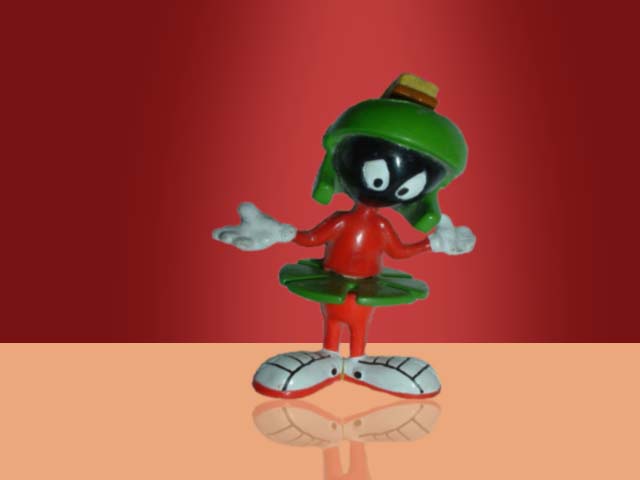Welcome to another installment of Word Soup!
While the television show The Soup brings you “the strange, obscure and totally unbelievable moments in pop culture, celebrity news and reality TV,” Word Soup brings you those strange, obscure, unbelievable (and sometimes NSFW) words from talk shows, sitcoms, dramas, and just about anything else on TV. Today we take a look at some pickup artist lingo, a few Britishisms, blah people, and more.
authorizing
Bailey: “He counters with some authorizing. He makes it seem like the last thing on his mind is hooking up. He just finds her interesting and wants to talk.”
“Till Death Do Us Part,” Castle, January 9, 2012
Authorizing is part of made-up pickup artist lingo constructed for this episode of Castle, and plays on “real” pickup artist lingo. Authorizing may have to do with the idea of being an authority and having power over women by feigning disinterest in a physical relationship.
blah
Ed Schulz: “Blah isn’t the word I heard.”
Rick Santorum: “I don’t want to make blah people’s lives better by giving them somebody else’s money.”
The Ed Show, January 6, 2011
Some claim that Santorum said black people, which he denied: “If you look at it, what I started to say is a word and then sort of changed and it sort of — blah — came out. And people said I said ‘black.’ I didn’t.” Mark Liberman at Language Log asserted that what Santorum said sounded more like bligh, and that perhaps Santorum “started to say ‘black’ and used the vowel in ‘lives’, as an ordinary sort of anticipatory speech error, perhaps enhanced by a sudden doubt about whether it was a good idea to bring race into the discussion.”
bronemy
Schmidt: “He’s my bronemy. My friemesis.”
“The Story of the 50,” New Girl, January 18, 2012
Bronemey is a blend of bro and enemy, and is the “bro” version of frenemy – a blend of friend and enemy – “someone who pretends to be your friend, but is really enemy,” or someone with whom one has a love/hate relationship. Friemesis is a blend of friend and nemesis. An older term with a similar meaning is backfriend, “a false or pretended friend; a secret enemy,” which seems to have first appeared in the 15th century and is also slang for hangnail.
bug-hunter
Doc [addressing a group of prostitutes]: “Pickpockets, lushingtons, and bug-hunters will be severely dealt with.”
“God of Chaos,” Hell on Wheels, January 15, 2012
A bug-hunter is “a street thief who specializes in snatching (drunken) men’s jewellery.” Bug was once slang for “breast-pin.” See this list for even more words for thief.
butter job
Esposito: “A butter job, what’s that?”
Bailey: “It’s when you flirt with the mark’s friend.”
“Till Death Do Us Part,” Castle, January 9, 2012
Butter job is another example of pickup artist lingo constructed for this episode of Castle, and perhaps comes from the idea of buttering up the targeted woman’s friend in order to get to the woman.
city, the
Anthony Bourdain: “[Sweetings is] one of the great institutions of what’s called ‘the city,’ London’s financial district.”
“London,” The Layover, January 16, 2012
In addition to the city, some other financial district nicknames include Wall Street (New York), FiDi (San Francisco), and La Defense (Paris).
duress
Emily: “Defense lawyers use the term duress to describe the use of force, coercion, or psychological pressure exerted on a client in the commission of a crime. When duress is applied to the emotionally unstable, the result can be as violent as it is unpredictable.”
“Duress,” Revenge, January 4, 2011
Duress comes from the Latin durus, “hard,” and is related to the word endure.
ex-stalk-tion
Bailey: “Mike’s our buddy. He got involved with this crazy stalker chick. Colette something. So we staged an abduction to scare her off. You call it an ex-stalk-tion.”
“Till Death Do Us Part,” Castle, January 9, 2012
Ex-stalk-tion is a blend of the Latin prefix ex, meaning “out of, from,” stalk, and the Latin noun suffix -ion. It may also be a play on extraction, “the act of taking out.”
faffing
Chris: “I’m sorry, but the Ben Wyatt that I know – I just don’t think he’d be happy sitting here faffing around.”
“The Comeback Kid,” Parks and Recreation, January 12, 2012
To faff is British slang that means “to waste time on an unproductive activity,” and originally meant “to move violently.” According to World Wide Words, faff may have started “as a dialect word in Scotland and Northern England at the end of the eighteenth century, as a description of the wind blowing in puffs or small gusts,” and “may have been imitative of the sound of gusty wind.” Another possibility is that it was an alteration of maffle or faffle, both of which mean “to stammer.”
Special thanks to Fritinancy for pointing this out.
lushington
Doc: “Pickpockets, lushingtons, and bug-hunters will be severely dealt with.”
“God of Chaos,” Hell on Wheels, January 15, 2012
A lushington is a tippler or habitual drinker. The word may came from lush, a drunkard, which may come from “the old German word Loschen, which also means strong beer, or possibly from lush in the Irish traveller argot Shelta, which meant to eat and drink.”
pannenkoek
Anthony Bourdain: “This place supposedly is where the Beastie Boys were inspired to write the lyric ‘When I am in Holland, I eat the pannenkoeken‘ which is a lyric I’ve had tattooed on my inner thigh since the release of Super Disco Breakin’.”
“Amsterdam,” The Layover, January 3, 2012
Pannekoek (pannenkoeken is plural) is a type of large Dutch pancake which can be savory or sweet.
pop-up
Anthony Bourdain: “Pop-up means just what it sounds like: a joint that pops up anywhere it can, for a few hours or days, then moves on.”
“San Francisco,” The Layover, January 9, 2012
Pop-up in this context refers to a pop-up restaurant, a temporary restaurant which often operates “from a private home, former factory or similar and during festivals.”
rice queen
Becky [in voiceover to Mike Chang]: “No, Chang Du, I’m no rice queen.”
“Yes/No,” Glee, January 17, 2012
Rice queen usually refers to “a gay non-Asian man who is mostly attracted to East Asian men,” with rice as a disparaging yet, some may argue, reappropriated reference to East Asian culture and queen as a disparaging yet reappropriated term for a gay man. This instance of rice queen could be considered an example of cultural appropriation, “the adoption of some specific elements of one culture by a different cultural group.”
sexpionage
Beckett: “That’s espionage.”
Castle: “More like sexpionage.”
“Till Death Do Us Part,” Castle, January 9, 2012
Sexpionage is a blend of sex and espionage, and means using sex to commit espionage, “the practice of spying.”
Siegbarste
Nick: “He was big. And he has this rare genetic disorder that deadens the nerves. And abnormally dense bones.”
Eddie: “Siegbarste. Your basic ogre.”
“Game Ogre,” Grimm, January 13, 2012
Siegbarste is German in origin. Sieg translates as “victory” while barste may be a corruption of bersten, “to burst or crack.”
straw man
Nash Castor: “That’s our Democratic straw man.”
“Politically Inept, with Homer Simpson,” The Simpsons, January 8, 2012
A straw man is “a person who is set up as a cover or front for a questionable enterprise.”
tweaky
Josh: “So, there were an unusual amount of tweaky looking vampires scuffling around the doorstep last night.”
“Turn This Mother Out,” Being Human, January 16, 2012
Tweaky means having the attributes of a tweaker, slang for “a person addicted to methamphetamines.” Tweaking describes a tweaker’s behavior, which is often compulsive and repetitive, and is a a type of stereotypy. The origin of this sense of tweaking is unknown, as far as we could find, but may be imitative of twitch, tik, or twinge. The vampires in this instance are craving blood, and as a result act like tweakers or drug addicts.
yobbery
Anthony Bourdain: “The dark side of British night life: binge drinking, drunken rickshaw tours, general yobbery.”
“London,” The Layover, January 16, 2012
Yobbery refers to behavior like that of a yob, British slang for “a rowdy, aggressive, or violent young man.” Yob is boy spelled backwards (presumably, a yob behaves in the opposite way a proper boy should) and attests to 1859.
That’s it for this week! Remember, if you see any Word Soup-worthy words, let us know on Twitter with the hashtag #wordsoup. Your word and Twitter handle might appear right here!

